新概念英语第一册(Lesson 1)学习笔记-全
Lesson101-102笔记(素材)新概念英语第一册

新概念第一册Lesson 101-102笔记Lesson 101A card from jimmy!吉米的明信片!单词表1 Scotland ['skɔtlənd] n.苏格兰(英国)4 hostel ['hɔstəl] n.招待所,旅馆课文:Read Jimmy's card to me please, penny.请把吉米的明信片念给我听听,彭妮。
'I have just arrive in Scotland and I'm staying at a Youth Hostel.' “我刚到苏格兰,我现住在一家青年招待所。
”Eh?什么?He says he's just arrived in Scotland.他说他刚到苏格兰。
He says he's staying at a Youth Hostel.他说他住在一家青年招待所。
You know he's a member of the Y.H.A.你知道,他是“青招协”的一个成员。
The what?什么?The Y.H.A., Mum.“青招协”,妈妈。
The Youth Hostels Association.青年招待所协会。
What else does he say?他还说了些什么?I'll write a letter soon.“我很快会写信的。
I hope you all well.“祝你们大家身体都好。
”What? Speak up. Penny.什么?彭妮,大声一点。
I'm afraid I can't hear you我可听不见你念的。
He say he'll write a letter soon.他说他很快会写信的。
He hopes we are all well.他祝我们大家身体好。
'Love, Jimmy.'“谨此问候,吉米。
新概念英语第一册lesson1
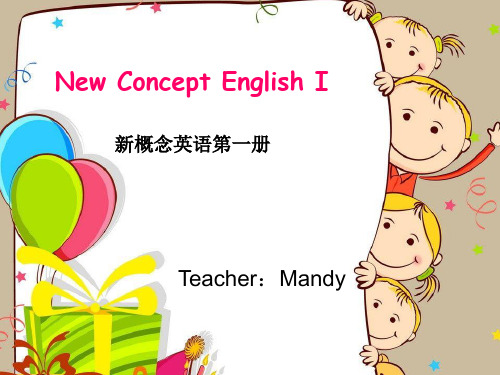
Lesson1: Excuse me! Man: Excuse me! Woman: Yes? Man: Is this your handbag? Woman: Pardon? Man: Is this your handbag? Woman: Yes, it is. Thank you very much.
handbag
pen
pencil
skirt
shirt
coat
dress
car
house
watch
Is this your........?
pen
pencil
book
watch
coat
dress
skirt
shirt
car
house
与陌生人的搭话,问路,
打断别人对话或从别人身
边挤过、走过时
数第三人称
He/She/Lele is a student. They/You/We/students are happy.
I am a teacher. yes /jes/ adv.
this /ðis/ pron.
是的
这
n. 手提包
handbag / 'hæ ndbæ g/
Is this your handbag?
Yes, it is.
Thank you very much.
Lesson1: Excuse me! Man: Excuse me! Woman: Yes? Man: Is this your handbag? Woman: Pardon? Man: Is this your handbag? Woman: Yes, it is. Thank you very much.
新概念英语第一册1-72学习笔记要点

Lessons 1-2课文详注 Further notes on the text1.Excuse me 对不起。
这是常用于表示道歉的客套话,相当于汉语中的“劳驾”、“对不起”。
当我们要引起别人的注意、要打搅别人或打断别人的话时,通常都可使用这一表达方式。
在课文中,男士为了吸引女士的注意而使用了这句客套话。
它也可用在下列场合:向陌生人问路,借用他人的电话,从别人身边挤过,在宴席或会议中途要离开一会儿等等。
2.Yes?什么事?课文中的 Yes?应用升调朗读,意为:“什么事?”Yes?以升调表示某种不肯定或询问之意,也含有请对方说下去的意思。
3.Pardon?对不起,请再说一遍。
当我们没听清或没理解对方的话并希望对方能重复一遍时,就可以使用这一表达方式。
较为正式的说法是:I beg your pardon.I beg your pardon?Pardon me.它们在汉语中的意思相当于“对不起,请再说一遍”或者“对不起,请再说一遍好吗?”4.Thank you very much.非常感谢!这是一句表示感谢的用语,意为“非常感谢(你)”。
请看下列类似的表达式,并注意其语气上的差异:Thank you.谢谢(你)。
Thanks!谢谢!5.数字1~10的英文写法1—one 2—two 3—three 4—four 5—five6—six 7—seven 8—eight 9—nine 10—ten语法 Grammar in use一般疑问句一般疑问句根据其结构又分为若干种。
通过主谓倒装可将带有be的陈述句变为一般疑问句。
即将be的适当形式移到主语之前,如:陈述句:This is your watch.这是你的手表。
疑问句:Is this your watch?这是你的手表吗?(可参见 Lessons 15~16语法部分有关 be的一般现在时形式的说明。
)词汇学习 Word study1.coat n.上衣,外套:Is this your coat?这是你的外套吗?coat and skirt<英>(上衣、裙子匹配的)西式女套装2.dress n.(1)连衣裙;套裙:Is this your dress?这是你的连衣裙吗?(2)服装;衣服:casual dress 便服evening dress 晚礼服Lessons3-41.My coat and my umbrella please. 请把我的大衣和伞拿给我。
新概念英语名师精讲笔记第一册lesson01-02
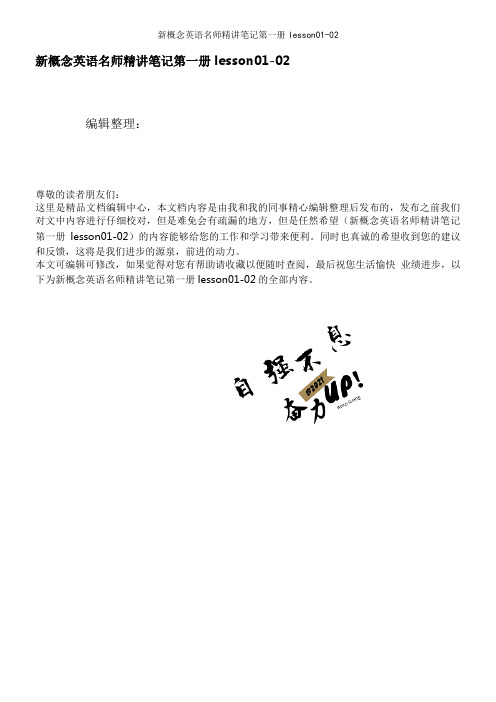
新概念英语名师精讲笔记第一册lesson01-02编辑整理:尊敬的读者朋友们:这里是精品文档编辑中心,本文档内容是由我和我的同事精心编辑整理后发布的,发布之前我们对文中内容进行仔细校对,但是难免会有疏漏的地方,但是任然希望(新概念英语名师精讲笔记第一册lesson01-02)的内容能够给您的工作和学习带来便利。
同时也真诚的希望收到您的建议和反馈,这将是我们进步的源泉,前进的动力。
本文可编辑可修改,如果觉得对您有帮助请收藏以便随时查阅,最后祝您生活愉快业绩进步,以下为新概念英语名师精讲笔记第一册lesson01-02的全部内容。
重点和难点一般疑问句词汇pen n。
钢笔【词组】pen name笔名 /pen pal笔友/ pen pusher文员pencil n。
铅笔【词组】pencil box铅笔盒,文具盒/pencil sharpener削铅笔刀,卷笔刀book n。
书籍【词组】book cabinet 书柜/Book of Changes《易经》(中国古籍)/book review书评/bookcase书架/book mark书签【联想】booking订票watch n.手表【用法】watch作动词时,是“细看,观看”.比如:watch TV看电视.coat n.上衣,外衣【词组】fur coat毛皮大衣dress n。
连衣裙【联想】dressing room更衣室(剧院)【用法】当dress作动词时,是“给……穿衣服”的意思。
比如:Please dress the babydressy adj.服装华丽的;well dressed adj.服装华丽的,衣着讲究的.skirt n.短裙【词组】mini skirt迷你裙,超短裙【联想】skit n.滑稽短剧(请注意它与skirt的拼写区别)在skirt中,请注意/s/与/k/需要发生连读浊化.shirt n。
衬衣car n。
汽车【词组】car bomb汽车炸弹/car park停车场house n。
新概念英语第一册自学笔记含课后练习答案:Lesson 121-122

新概念英语第一册自学笔记含课后练习答案:Lesson121-122新概念英语第一册121-122课课文重难点 further notes on thetext1.…but i forgot to take them with me.……但是我忘了拿走。
forget to do sth.表示“忘了做某事”,them指两本字典。
2.put it on,戴上它。
这里的 it指 a hat,以避免重复。
put on是“戴上”、“穿上”的意思。
如果它的宾语是一个名词,这个名词可放在 put on之后,也可放在put和on之间。
如果是代词,就必须放在put和on 之间。
如:put on your coat./put your coat on.穿上外衣。
但只能说:put it on.把它穿上。
新概念英语第一册121-122课语法知识点 grammar in use定语从句定语从句像形容词一样起修饰作用,但位于所修饰的名词之后。
定语从句由关系代词引导,紧跟在它所修饰的成分后面。
关系代词 who,whom与 that修饰人,which与 that修饰东西。
关系代词指代从句的主语或宾语,同时又充当连接词,把从句和主句连接起来。
请看例句:(1)关系代词作从句的主语(who/which/that):the dog which/that is carrying the basket is mine.叼着篮子的那只狗是我的。
he's the porter who/that carried my suitcase.他就是那个扛着我的衣箱的搬运工。
(2)关系代词作从句的宾语(whom/that/which):they're the windows which/that the children broke yesterday.这些就是孩子们昨天打碎的窗户。
she's the lady whom i served yesterday.她就是我昨天服务过的那位女士。
新概念第一册自学导读,习题答案

新概念第一册自学导读,习题答案自学新概念英语第一册87-88课自学笔记,包括87-88课的课文重难点详解、语法知识点、重点单词学习和88课的课后练习答案。
新概念英语第一册87-88课课文知识点 Further notes on the text1.When did you bring it to us? 您什么时候送来的?bring表示“送来”、“带来”和“拿来”的意思,在方位上多指朝说话人而来。
2.…they're still working on it. ……他们还在修呢。
work on 表示“从事”、“干”(某事)。
still是“仍然”、“还在”的意思,此处在句中对 working on it起了强调的作用。
3.have a look at it, 看一下。
这里的 it指 car,以防止重复。
这里的 look是名词,have a look at与 look at意思是一样的。
4.Isn't that your car? 这难道不是您的车吗?Didn't you have a crash? 难道您没有出车祸吗?在英文中可以用一般疑问句的否认形式来表示期待、请求或希望得到肯定的答复。
新概念英语第一册87-88课语法知识点 Grammar in use现在完成时的疑问式及否认式现在完成时的构成是 have/has+ 过去分词,因此其疑问式是将have/has提到主语之前,否认式那么在have/has后加上not即可。
新概念英语第一册87-88课词汇学习 Word study1.repair v.(1)修理;修复;修补:I'll have to get the bicycle repaired. 我得请人把自行车修理一下。
She looked into the mirror and began to repair her face. 她向镜中望去,开始往脸上重敷脂粉。
裕兴版新概念英语同步笔记第一册第1课
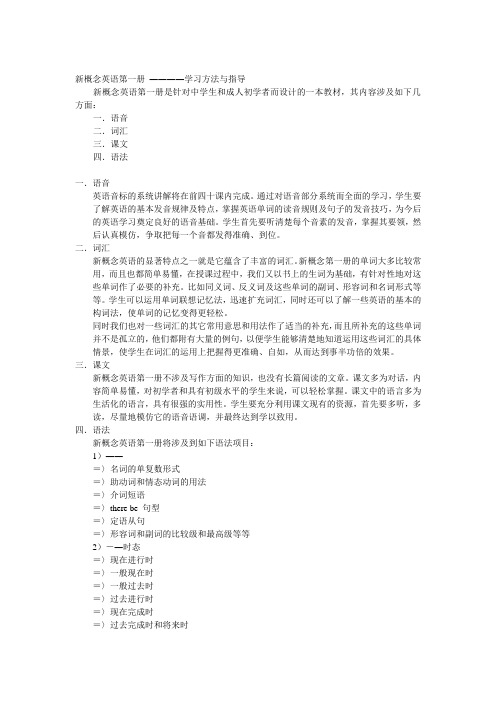
新概念英语第一册――――学习方法与指导新概念英语第一册是针对中学生和成人初学者而设计的一本教材,其内容涉及如下几方面:一.语音二.词汇三.课文四.语法一.语音英语音标的系统讲解将在前四十课内完成。
通过对语音部分系统而全面的学习,学生要了解英语的基本发音规律及特点,掌握英语单词的读音规则及句子的发音技巧,为今后的英语学习奠定良好的语音基础。
学生首先要听清楚每个音素的发音,掌握其要领,然后认真模仿,争取把每一个音都发得准确、到位。
二.词汇新概念英语的显著特点之一就是它蕴含了丰富的词汇。
新概念第一册的单词大多比较常用,而且也都简单易懂,在授课过程中,我们又以书上的生词为基础,有针对性地对这些单词作了必要的补充。
比如同义词、反义词及这些单词的副词、形容词和名词形式等等。
学生可以运用单词联想记忆法,迅速扩充词汇,同时还可以了解一些英语的基本的构词法,使单词的记忆变得更轻松。
同时我们也对一些词汇的其它常用意思和用法作了适当的补充,而且所补充的这些单词并不是孤立的,他们都附有大量的例句,以便学生能够清楚地知道运用这些词汇的具体情景,使学生在词汇的运用上把握得更准确、自如,从而达到事半功倍的效果。
三.课文新概念英语第一册不涉及写作方面的知识,也没有长篇阅读的文章。
课文多为对话,内容简单易懂,对初学者和具有初级水平的学生来说,可以轻松掌握。
课文中的语言多为生活化的语言,具有很强的实用性。
学生要充分利用课文现有的资源,首先要多听,多读,尽量地模仿它的语音语调,并最终达到学以致用。
四.语法新概念英语第一册将涉及到如下语法项目:1)――=〉名词的单复数形式=〉助动词和情态动词的用法=〉介词短语=〉there be 句型=〉定语从句=〉形容词和副词的比较级和最高级等等2)-―时态=〉现在进行时=〉一般现在时=〉一般过去时=〉过去进行时=〉现在完成时=〉过去完成时和将来时作为英语的学习者,要准确地掌握语法规则才能准确地把握句子结构。
新概念英语第一册课文翻译及学习笔记Lesson1
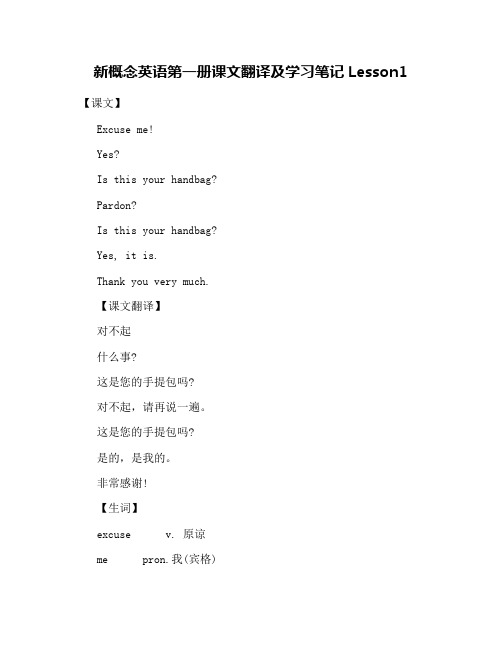
新概念英语第一册课文翻译及学习笔记Lesson1【课文】Excuse me!Yes?Is this your handbag?Pardon?Is this your handbag?Yes, it is.Thank you very much.【课文翻译】对不起什么事?这是您的手提包吗?对不起,请再说一遍。
这是您的手提包吗?是的,是我的。
非常感谢!【生词】excuse v. 原谅me pron.我(宾格)yes adv. 是的is v. be 动词现在时第三人称单数this pron.这your adj. 你的,你们的handbag n. (女用)手提包pardon int. 原谅,请再说一遍it pron.它thank you 感谢你(们)very much 非常地【知识点讲解】1. Excuse me 是一个很常用的词组,通常用来引起对方注意或是搭话。
它的字面意思是“原谅+我”,但一般不用来跟人道歉,道歉还是应该用sorry。
2. 文中的yes有两种意思:其一是有人叫你时,回答对方;其二是表示肯定。
3. pardon本身也是“原谅”的意思,这里的意思是“不好意思我没有听清楚,请再说一遍”。
要对方重复,也能够说"Sorry?"4. Is this your handbag? 这是你的手提包吗?这是疑问句的句型,变成叙述句应该是:This is your handbag. 这是你的包。
5. handbag,一般指女生用的手提包。
钱包是purse,男生的公文包是briefcase。
新概念英语第一册完整学习笔记
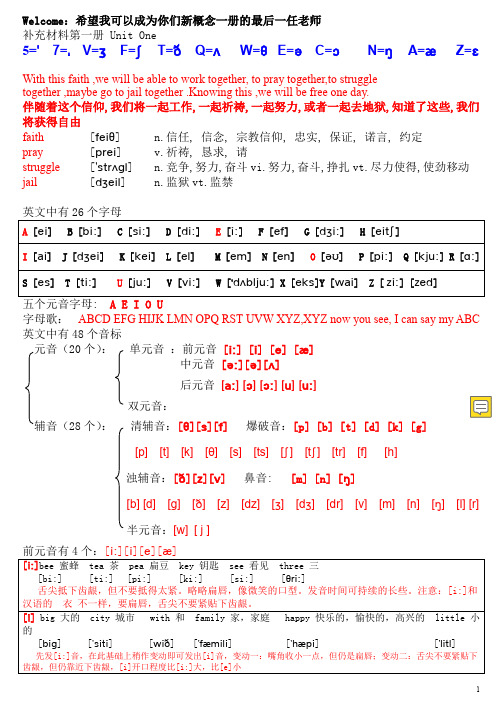
Welcome:希望我可以成为你们新概念一册的最后一任老师补充材料第一册 Unit One5= 7= V= F= T= Q= W= E= C= N= A= Z=With this faith ,we will be able to work together, to pray together,to struggletogether ,maybe go to jail together .Knowing this ,we will be free one day.伴随着这个信仰,我们将一起工作,一起祈祷,一起努力,或者一起去地狱,知道了这些,我们将获得自由faith[ ] n.信任, 信念, 宗教信仰, 忠实, 保证, 诺言, 约定pray [ ] v.祈祷, 恳求, 请struggle[ ] n.竞争,努力,奋斗vi.努力,奋斗,挣扎vt.尽力使得,使劲移动jail[ ] n.监狱vt.监禁字母歌:ABCD EFG HIJK LMN OPQ RST UVW XYZ,XYZ now you see, I can say my ABC 英文中有48个音标元音(20个):单元音:前元音[ ] [ ] [ ] [ ]中元音[ ][ ][ ]后元音[ ] [ ] [ ] [ ] [ ]双元音:辅音(28个):清辅音:[ ][ ][ ]爆破音:[p] [b] [t] [d] [k] [g][p] [t] [k] [θ] [s] [ts] [ ] [t ] [tr] [f] [h]浊辅音:[ ][ ][ ]鼻音: [m] [n] [ ][b] [d] [g] [ ] [z] [dz] [ ] [d ] [dr] [v] [m] [n] [ ] [l] [r]半元音:[w][ j ]清辅音[ ]浊辅音[ ]舌尖抵下齿龈,但不要贴紧,气流由舌尖和下齿之间流出清辅音 [ ]浊辅音 [ ]上齿轻放在下齿上,但不要咬唇,气流由上齿和下齿之间冲出清辅音 [ ]浊辅音 [ ]以th打头的单词一般是发[ ]、[ ]经典口语:1. a bad apple一个坏苹果->坏蛋,惹麻烦,不诚实的人2. big apple大苹果->纽约的别称3. a fat cat肥猫->大款,暴发户(贬义)4. a hot potato棘手的问题5. a bird in the hand is worth two in bush.[ ]n.矮树丛双鸟在林,不如一鸟在手6. A friend in need is a friend indeed.患难之交才是真朋友7. God helps those who help themselves.天助自助者地道情景表达:Hi!/Hello!/Hullo!/How do you do?(初次见面用)(Good) morning/afternoon/evening!How are you?/How are you going?/How are you all keeping?你们好吗?Fine/well. Thank you. And you?/What about you?/How about you?Not too bad!/Pretty [ i]adj.漂亮的good!/Couldn't [ ]be better!/Just so-so./I'm just my oldself!还不坏!/非常好!/好的不能再好了!/凑合吧!/我还是老样子!Nice/Glad/Pleased to see/meet you! meet 强调第一次见面see 强调第二次见面,老朋友见面。
新概念英语第一册101-110课自学笔记(很全、很好)
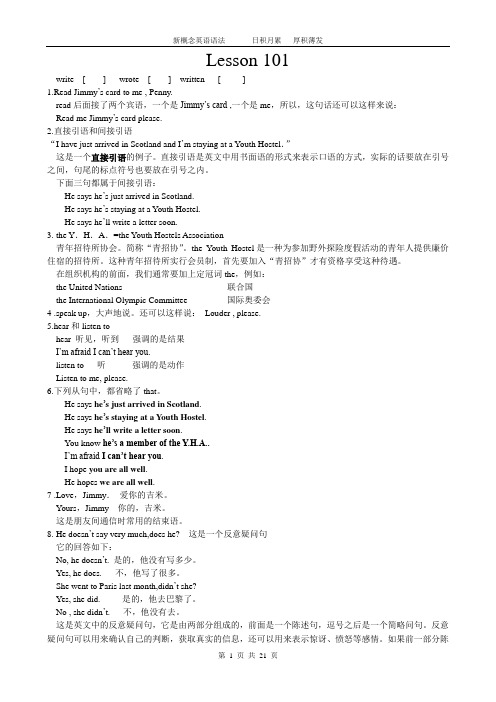
Lesson 101write [ ] wrote [ ] written [ ]1.Read Jimmy’s card to me , Penny.read后面接了两个宾语,一个是Jimmy’s card ,一个是me,所以,这句话还可以这样来说:Read me Jimmy’s card please.2.直接引语和间接引语“I have just arrived in Scotland and I’m staying at a Youth Hostel.”这是一个直接引语的例子。
直接引语是英文中用书面语的形式来表示口语的方式,实际的话要放在引号之间,句尾的标点符号也要放在引号之内。
下面三句都属于间接引语:He says he’s just arrived in Scotland.He says he’s staying at a Youth Hostel.He says he’ll write a letter soon.3. the Y.H.A.=the Youth Hostels Association青年招待所协会。
简称“青招协”。
the Youth Hostel是一种为参加野外探险度假活动的青年人提供廉价住宿的招待所。
这种青年招待所实行会员制,首先要加入“青招协”才有资格享受这种待遇。
在组织机构的前面,我们通常要加上定冠词the,例如:the United Nations 联合国the International Olympic Committee 国际奥委会4 .speak up,大声地说。
还可以这样说:Louder , please.5.hear和listen tohear 听见,听到强调的是结果I’m afraid I can’t hear you.listen to 听强调的是动作Listen to me, please.6.下列从句中,都省略了that。
He says he’s just arrived in Scotland.He says he’s staying at a Youth Hostel.He says he’ll write a letter soon.You know he’s a member of the Y.H.A..I’m afraid I can’t hear you.I hope you are all well.He hopes we are all well.7 .Love,Jimmy.爱你的吉米。
[全]新概念英语第一册短语归纳1-40课详解
![[全]新概念英语第一册短语归纳1-40课详解](https://img.taocdn.com/s3/m/736ab91fce2f0066f433222a.png)
新概念英语第一册短语归纳1-40课详解Lesson 1~ 2Excuse me. 对不起。
I beg your pardon. 请再说一遍。
thank you 感谢你(们)very much 非常地Thank you very much 非常感谢= Many thanks.= Thanks a lot.= Thanks very much.You’re welcome. 不必谢。
That’s all right. 没关系/ 不客气。
= That’s OK.= Not at all.It was nothing. 没什么。
It’s a pleasure. 我很乐意。
= My pleasure。
Lesson 3~ 4I’m sorry. 对不起.Lesson 5~ 6Good morning. 早上好.This is + 人名将某人介绍给他人Nice to meet you. 很高兴见到你。
Nice to meet you, too. 我也很高兴见到你。
Glad to meet you. 很高兴见到你。
Pleased to meet you. 很高兴见到你。
How do you do? 你好!what make 什么牌子an new student 一个新学生Lesson 7~ 8what nationality 什么国籍What’s your job? 你是做什么工作的?a keyboard operator 电脑操作人员an engineer 一个工程师Lesson 9~ 10 How are you? 你好吗?I’m fine. 我很好。
= I’m very well.How have you been? 你近况如何?How is everything going on? 一切都好吗? Just fine. 还好。
Just so so. 马马虎虎。
Not bad. 不坏。
Nice to see you. 见到你真高兴.Nice to see you, too. 见到你我也很高兴. look at …看……Lesson 11~ 12Whose shirt 谁的衬衫Here you are. 给你.Lesson 13~ 14what colour 什么颜色come upstairs 上楼go downstairs 下楼nice dress 漂亮的裙子lovely hat 可爱的帽子the same 同一的; 相同的Here they are. 给你(复数)Here it is. 给你(单数)Lesson 15~ 16customs officer 海关官员That’s fine. 好了。
新概念英语第一册学习笔记(可打印)
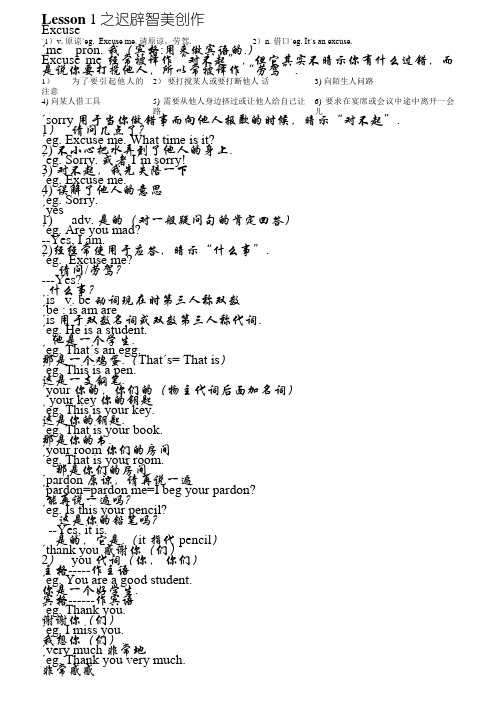
Lesson 1之迟辟智美创作Excuse΄1)v. 原谅΄eg. Excuse me. 请原谅,劳驾. 2)n. 借口΄eg. It΄s an excuse.΄me pron. 我(宾格:用来做宾语的.)Excuse me经常被译作“对不起”,但它其实不暗示你有什么过错,而是说你要打搅他人,所以常被译作“劳驾”.1)为了要引起他人的注意2)要打搅某人或要打断他人话3) 向陌生人问路4) 向某人借工具5) 需要从他人身边挤过或让他人给自己让路6) 要求在宴席或会议中途中离开一会儿΄sorry 用于当你做错事而向他人报歉的时候,暗示“对不起”. 1)请问几点了?΄eg. Excuse me. What time is it?2) 不小心把水弄到了他人的身上.΄eg. Sorry. 或者I΄m sorry!3) 对不起,我先失陪一下΄eg. Excuse me.4) 误解了他人的意思΄eg. Sorry.΄yes1) adv. 是的(对一般疑问句的肯定回答)΄eg. Are you mad?--Yes, I am.2)经经常使用于应答,暗示“什么事”.΄eg. Excuse me?请问/劳驾?---Yes?什么事?΄is v. be 动词现在时第三人称双数΄be : is am are΄is 用于双数名词或双数第三人称代词.΄eg. He is a student.他是一个学生.΄eg. That΄s an egg.那是一个鸡蛋.(That΄s= That is)΄eg. This is a pen.这是一支钢笔.΄your 你的,你们的(物主代词后面加名词)΄your key 你的钥匙΄eg. This is your key.这是你的钥匙.΄eg. That is your book.那是你的书.΄your room 你们的房间΄eg. That is your room.那是你们的房间.΄pardon 原谅,请再说一遍΄pardon=pardon me=I beg your pardon?能再说一遍吗?΄eg. Is this your pencil?这是你的铅笔吗?--Yes, it is.是的,它是.(it 指代 pencil)΄thank you 感谢你(们)2)you 代词(你,你们)主格-----作主语΄eg. You are a good student.你是一个好学生.宾格------作宾语΄eg. Thank you.谢谢你(们)΄eg. I miss you.我想你(们).΄very much 非常地΄eg. Thank you very much.非常感感΄eg. I love you very much.我非常爱你.. Grammar1. 一般疑问句;把系动词be(is, am, are) 置于句首΄eg. This is a handbag.这是一个手提包.(肯定句)΄eg. Is this a handbag.---Yes, it is. (肯定回答)(it 代handbag)---No, it is΄t.(否定回答)2. 否定句:把not 加在系动词的后面΄is not = isn΄t΄am not΄are not΄eg. This is not my handbag.小结1. Excuse me .对不起,劳驾.2. Pardon?请再说一遍.3. Thank you very much.非常感谢.΄watch1) n. 手表΄eg. My watch is new.我的手表是新的.΄eg. Is that your new watch?---Yes , it is.2) v 看΄watch TV΄house 房子Exercise BLook at the situations. What expression do you use for each?1. You don΄t hear so mething very clearly. What do you say?当你没有听清楚他人的说话时,你应该说:Pardon?I beg your pardon?Pardon me?2. If you what to leave for a little while in the meeting. What do you say?会议中途你想离开一会儿,你应该说:Excuse me3. When you step on one΄s foot, what do you say?当你不小心踩了他人的脚时,应该说:Sorry.4. When someone helps you. What do you say?当他人帮手了你,你应该说Thank youThank you very much小结含有系动词is 的句型转换1. 陈说句 This is …..That is….2.一般疑问句 Is….?3.肯定回答:Yes , it isYes , she is4.否定回答:No, it isn’t .No, she isn’t.5. 否定句:系动词后面加not.语音中元音:[Λ]—u o ou口腔几乎全开,嘴唇成自然状态,短音.‘up 向上 shut 关上 cup 茶杯 bus 公共汽车 much 许多 lunch‘son 儿子 honey 亲爱的人 money 钱 other 其它的‘enough 足够的 cousin 侄子 young 年轻的Read these sentences:1. You shut up. 你闭嘴.2. My son has much money. 我儿子有许多钱.3. His son always comes here for money. 儿的儿子总是来这儿要钱.4. Her young cousin has enough money for the lunch.她的小侄子有足够的钱付这顿午餐.中元音:[ə:]—ir ur or er ear口腔半开,嘴唇成自然状态,长音.‘bird 鸟 first 第一 girl 女孩 dirty 脏的 shirt 衬衫‘turn 翻转 church 教堂nurse 护士burn 燃烧‘work 工作 worm 虫子 word 单词 world 世界 worse 更坏的‘verb 动词 mercy 同情‘early earth searchRead these sentences;1. This nurse wears a dirty shirt 这位护士穿了一件脏裙子.2. It’s the early bird that catches the worm.早起的鸟有虫吃.3. This girl works in the church.中元音:[ə] ---er‘worker teacher sister brother‘about arrive among1. Her sister is a teacher.2. This famous doctor arrives in the city.3. His sister wants some sugar.New words and expressions‘please1) 请(可置于句首,也可置于句末)Come in please=Please come inSit down please=Please sit down2) 求求你(重读)‘eg. Don’t tell my mother about it, please! 不要把这件事告诉我的妈妈,求求你了.‘eg. Help me, please! 帮帮我,求求你了.‘here adv. 这里‘there adv. 那里‘eg. Come here. 到这儿来.‘eg. Go there. 到那儿去.‘here 与 there 置于句首时,后面主谓要倒装.‘eg. Here is my ticket.(here放置于句首,后面的系动词is 在主语my ticket的前面)正常语序:My ticket is here.‘‘my pron. 我的(物主代词不成以独自使用后面要加名词)Her boyfriend is very rich.她的男朋友很有钱.Welcome to our school.欢迎到我们学校来.‘ticket n. 票‘an air ticket‘a train ticket‘a bus ticket‘a cinema ticketHere is my air ticket‘‘telephone number 德律风号码‘number + 基数词第….‘number one 第一‘number twoI am number one.‘Lesson five 第五课‘day five 第五天‘five +可数名词复数形式五个…(暗示数量为两个以上的名词都要用复数形式,即在词尾要加s)‘five handbags 五个手提包’‘sorry 经常使用于对自己所犯的过失暗示报歉Excuse me .打搅他人时说的客套话.I’m sorry,. I broke yourglass.Excuse me. May I ask you a question?‘sir n. 先生暗示对不相识的男子,年长者或上级的一种尊称,一般独自便用,后面不与姓氏连用.Excuse me, sir.Thank you, sir.Can I help you, sir?Mr. 也是“先生”的意思,但与sir的用法上有所分歧,Mr..必需与姓氏连用,不成独自便用.Mr. Zhang.TestQuestion:Does the man get his umbrella back? 这位男士有没有要回他的雨伞?My coat and my umbrella please.此句省略了动词give(给)‘give sb sth 把某物给某人(sb 是somebody 的缩写,暗示“某人”)(sth 是 something的缩写,暗示“某物”)Give me my coat and my umbrella please.Here is my ticket此句为倒装句,副词here/three置于句首时,主谓要倒装.正常语序:My ticket is here.Here’s your umbrella and your coat.‘and 暗示“和”,是连词,连接两个并列成分,位置可以互换.My father and my mother.Is this your umbrella?此句为一般疑问句.含有系动词be 的陈说句酿成一般疑问句,把系动词置于句首,句号变问号,用升调.Is this her can?Yes, it is.Is this it ? = Is this your umbrella?‘it 指your umbrella,由于前面提到了umberlla, 所以后面就用it 来取代,以免重复.I want a man’s suit. 我想要一套男装.‘at school 在学校求学Her son is at school.她的儿子在学上校上学.‘go to school 去上学My son is very strong.My daughter is very lovely.我的女儿非常可爱.我妈妈的那套衣服不是黑色的.My mother’s(名词所有格) suit isn’t black.Lesson5语音:后元音(五个); 用舌的后部感觉发音.[a:] 口腔全开,嘴唇成自然装态,不扁也不圆,长音.‘ar car hard star park farm dark party start‘a fast past father‘ear heart‘al half1. You can’t park your car on the farm.2. The party starts at half past ten.3. I can’t see the stars in the dark sky.[]发音时舌尖要离开下齿龈,口形椭圆,肌肉放松,短音.闭音节单词中o‘job clock long stop lost got boss hot‘a watch water1. She lost that job, but she got this job.2. The clock often stops.[]‘or born sport horse short‘al all tall fall wall talk‘aw paw law draw‘au‘augh taught caughtLesson fiveMr. 先生(不成独自使用)Mr. + 姓氏Mr. leeMr. zhang‘sir 先生可以独自使用,是对上级,长者,或陌生男性的尊称.Sir 后面不能加姓氏.Thank you, sir.Sorry, sir.Can I help you, sir?‘good adj. 好反义词 bad adj. 坏的This is a good book.She is a good teacher.‘morning n. 早晨‘afternoon n. 下午‘evening n. 晚上‘night n. 夜里Good morning.Good afternoon,Good eveningGood night‘in the morning 在早上‘in the afternoon 在下午‘in the evening 在晚上‘at night 在夜里Miss 小姐(一般指未婚女性)Miss + 姓氏Miss LeeMrs. 太太(己婚女性)Mrs. +丈夫的姓氏Mrs. Black 布莱克太太(其丈夫姓Black)Ms. 女士(对未知婚姻状况者的称呼)Ms. Lee 李女士英语国家人名的构成:‘first name + middle name + aurname名字中间名姓‘new adj. 新的反义词 old adj. 旧的That is my new shirt.Is this your old dress?French n. 法国人(国籍);法语‘adj. 法国的Miss Lee is French.I can speak French.He is a French student.France n. 法国(国名)I come from France.I am from France.German n. 德国人(国籍);德语‘adj. 德国的Are you German?He can speak German.Is Miss Sophie Dupont a German student?Germany [‘ə:məmi]n.德国(国名)‘meet v 遇见,碰见Nice to meet you这是非正式场所下初度见面时的客套用语.回答也应为:Nice to meet you, too.在正式场所中How do you do? 你好回答也是How do you do?Japanese n. 日自己(国籍),日语‘adj. 日本的Japan n. 日本(国名)Korean n. 韩国人(国籍); 韩国语‘adj. 韩国的Korea n. 韩国(国名)Chinese n.中国人(国籍); 汉语‘adj. 中国的China n. 中国(国名)China is a big country.‘too adv. 也用在肯定和疑问句中.否定句中用either, too 和 either 一般都放在句末,而且用逗号隔开.Miss Dupont is French, too.Mrs. Lee is not German, either.Good morning.也可以直接用hello 问好.This is Miss Sophie Dupont. Sophie is a new student. She is French.“This is + 姓名”是把一个人介绍给另一个人时用的句型.向他人介绍自己时:My name is 或者是 I am.He is German=He is from Germany.Nice to meet you.用于非正式场所的初度见面.回答:Nice to meet you, too.Lesson 6‘make1) n. (产物的)牌号My shirt is a Korean make.我的衬衫是韩国牌子的.What make is your car?2) v. 制造,做make a car‘make a model plane.Swedish n. 瑞典人(国籍)‘adj. 瑞典的Sweden n. 瑞典(国名)Sweden is in Europe.瑞典在欧洲.‘英语,英国人England n. 英格兰,英国American adj. 美国的‘n 美国人America n. 美国Italian adj. 意年夜利的‘意年夜利人,意年夜利语Italy n. 意年夜利(国名)选择疑问句Is she a Chinese teacher or a Japanese teacher?She isn’t a Chinese teacher. She is a Japanese teacher.Lesson 7‘name 姓名My name is ….Your name is …His name is …Her name is…My name is Wendy.I am …含系动词的特殊疑问句结构:特殊疑问句+系动词+主语?What color is his shirt?What is your name?‘nationality n. 国籍What nationality are you?你是哪国人?Where are you from?Where do you come from?‘job 工作What is your job?What do you do?你的工作是什么?Lesson nine‘how 怎么样 (特殊疑问词)‘how many 几多(可数名词复数)How many students?‘how much 几多(不成数名词,价格)How much tea?How much is the handbag?‘how long 多长时间How long have you been in China?‘how often 多经常(频率)How often do you take a bath?‘how far 多远(距离)How far is it from here?‘how soon 多久I am leaving for Shanghai on business.How soon will you come back?‘well1) adv. 好(修饰动词)He cooks well.He dose well in English.3) adj. 身体好How are you, today?I am well. Thank you, and you?‘see 暗示结果‘look 强调举措过程Look at the blackboard.‘watch 看,注视(所看画面是移动的)Nice to meet you.(初度见面时打招呼用语)Nice to see you.(相互认识的人见面时打招呼用)This is our classroom.Whose classroom is this?Whose is this classroom?形容词性物主代词是修饰名词的,所以后面必需加名词.This suit is my. (错语)This suit is mine. (正确)名词性物主代词必需独自使用,后面不再接名词.名词所有格是在词尾加’s.这种形式即具有形容词性,也具有名词性.Whose shirt is this?This is Wendy’s(作形容词性物主代词来用) skirt.=This is her skirt. Whose is this skirt?This skirt is Wend’s. =This skirt is hers.Your car is red; mine is blue.‘mine =my carI have my way, and she has hers.我有我的处事方式,她有她的.‘whose 引导的特殊疑问句即可用形容词性物主代词回答,也可用名词性物主代词回答.Whose house is this?This is our house. = This house is ours.‘perhaps=maybe 可能Perhaps it will rain.Perhaps it is his car.‘catch v.1) 接住Catch2) 逮住,捕捉‘catch a thief3) 染上(疾病‘catch a cold‘father=Dad‘mather=Mum‘parents: father and motherHis parents is in Germany.(his parent 复数,故系动词用are)What makeWhat make is your watch?‘come v. 来‘go v. 去Come on; let’s go swimming.来吧,我们去游泳.Come on; stop day-dreaming.得了,奉求,别再做白天梦了.Come on; you’ll be fine.没关系,你会没事的.‘upstairs adv. 楼上‘downstairs adv. 楼下‘here there home abroad地址副词前不成以加介词.‘come here 不成以说成 come to here.‘smart adj.1) 漂亮的; 时髦的Lucy’s blouse is smart.Her hat is very smart2) 聪慧的; 机灵的She is a smart student.He is a smart businesman.‘clever 聪明的(指理解力); 狡猾的‘bright (多指小孩)Your little son is so bright.‘wise 理性的; 精明的(形容年纪较长者)‘lovely 可爱的Whose is this lovely hat?Whose lovely hat is this?It’s Ann’s (hat)‘cute 小孩可爱The baby is cute.祁使句:谓语动词一般用原形,暗示请求建议命令等.Follow meShut the door, pleaseBe carefulGo and buy a new hat.Wait and see‘same 常与the 连用暗示同一的,相同的‘the same ageThe same cityWe live in the same city.‘friend n. 朋友Are they your friends?‘‘be friendly to sb 对….友好She is friendly to me.(to 介词后面要接宾语)2)在以“s”“x”“sh”“ch”结尾的双数名词变复数时,需在单词后面加“es”‘bus buses dress dresses3) 以元音字母加“y”结尾的双数名词变复数,我们在词尾加s‘boy boys以辅音字母加“y”结尾的单词,需把“y”去失落再加ies。
新概念英语1学习笔记

Pardon? 全句为 I beg your pardon.Is this your…?这是你的……吗?What make is it?它是什么牌子的?What’s your job?你是做什么工作的?look at…看……Whose is this…? This is my/your/his/her…这……是谁的?这是我的/你的/他的/她的……Whose is that…? Th at is my/your/his/her…那……是谁的?那是我的/你的/他的/她的……Come upstairs and see it.不能用Come upstairs to see it.What colour’s your…?你的……是什么颜色的?Are you…? 你们是……吗?可数名词的复数形式一般是在名词后面加上-s;如果名词是以-s结尾的,变成复数时要加-es。
表示复数的-s或-es一般遵循以下发音规则:1.如果名词词尾的发音是一个清辅音(/s/,/ʃ/,/ʧ/除外),-s发/s/的音;2.如果名词词尾的发音是一个浊辅音(/z/,/ʒ/,/ʤ/除外)或元音,-s发/z/的音;3.如果名词词尾的发音是/s/,/z/,/ʃ/,/ʒ/或/ʤ/,-s发/ɪz/的音。
What are their jobs?他们是做什么工作的?如果名词是以-f或-fe结尾的,变成复数时,一般要把-f或者-fe变成-v,再加-es。
英语中有一些名词的复数形式是不规则的。
Look at them!看看他们/它们!Give me/him/her/us/them a…给我/他/她/我们/他们一……Which one?哪一……?Give me/him/her/us/them some…给我/他/她/我们/他们一些……Which ones?哪些……?人称代词作宾语时要用人称代词的宾格,如me(I的宾格),us(we的宾格),you(you的宾格),him(he 的宾格),her(she的宾格),them(they的宾格)和it(it的宾格)。
新概念英语第一册Lessons1--143课文(精排版)

Lesson1: Excuse me!Excuse me!Yes?Is this your handbag?Pardon?Is this your handbag?Yes, it is.Thank you very much.Lesson 3:Sorry sir.My coat and my umbrella please. Here is my ticket.Thank you sir.Number five.Here is your umbrella and your coat. This is not my umbrella.Sorry sir.Is this your umbrella?No, it isn't.Is this it?Yes, it is.Thank you very much.Lesson 5: Nice to meet you.Good morning.Good morning, Mr. Blake.This is Miss Sophie Dupont.Sophie is a new student.She is a French.Sophie, this is Hans.He is German.Nice to meet you.And this is Naoko.She’s Japanese.Nice to meet you.And this is Chang-woo.He’s Korean. (朝鲜人)Nice to meet you.And this is Luming.He’s Chinese.Nice to meet you.And this is Xiaohui.She’s Chinese, too.Nice to meet you.Lesson 7: Are you a teacher? I’m a new student.My name’s Robert.Nice to meet you.My name’s Sophie.Are you French?Yes, I’m.Are you French, too?N o, I’m not.What nationality are you? I’m Italian.Are you a teacher?No, I’m not.What’s your job?I’m a keyboard operator. What’s your job?I’m an engineer.Lesson 9: How are you today? Hello, Helen.Hi, Steven.How are you today?I’m very well, Thank you. And you?I’m fine, thanks.How is Tony?He’s fine, Thanks.How’s Emma?She’s very well, too, Helen. Goodbye, Helen.Nice to see you.Nice to see you, too, Steven. Goodbye.Lesson 11: Is this your shirt? Whose shirt is that?Is this your shirt, Dave?No, sir.It’s not my shirt.This is my shirt.My shirt is blue.Is this shirt Tim’s?Perhaps it is, sir.Tim’s shirt is white.Tim!Yes, sir.Is this your shirt?Yes, Sir.Here you are.Catch.Thank you, sir.Lesson 13: A new dressWhat color is your new dress?It is green.Come upstairs and see it. Thanks you.Look!Here it is!That’s a nice dress.It’s very smart.My hat’s new, too.What color is it?It’s the same color.It’s g reen, too.That’s a lovely hat.Lesson 15: Your passport, please. Are you Swedish?No, we are not.We are Danish.Are your friends Danish, too? No, they aren’t.They are Norwegian.Your passport, please.Here they are.Are there your cases?No, they aren’t.Our cases are brown.Here they are.Are you tourists?Yes, we are.Are your friends tourists too?Yes, they are.That’s fine.Thank you very much.Lesson 17: How do you doCome and meet our employees, Mr. Richards. Thank you, Mr. Jackson.This is Nicola Grey, and this is Claire Taylor. How do you do?Those women are very hard-working.What are their jobs?They’re keyboard operators.This is Michael Baker, and this is Jeremy Short. How do you do?They aren’t very busy!What are their jobs?They’re sales reps.They are very lazy.Who is this young man?This is Jim.He is our office assistant.Lesson 19: Tired and thirstyWhat’s the mater, children?We are tired and thirsty, Mum.Sit down here.Are you all right now?No, we aren’t.Look!There’s an ice cream man.Two ice creams please.Here you are, children.Thanks, Mum.These ice creams are nice.Are you all right now?Yes, we are, thank you.Lesson 21: Which book?Give me a book please, Jane.Which book?This one?No, not that one. The red one.This one?Yes, please.Here you are.Thank you.Lesson 23: Which glasses?Give me some glasses please, Jane. Which glasses?These glasses.No, not those. The ones on the shelf. These?Yes, please.Here you are.Thanks.Lesson25: Mrs. Smith’s kitchenMrs. Smith’s kitchen is small.There is a refrigerator in the kitchen.The refrigerator is white.It is on the right.There is an electric cooker in the kitchen. The cooker is blue.It is on the left.There is a table in the middle of the room. There is a bottle on the table.The bottle is empty.There is a cup on the table, too.The cup is clean.Lesson 27: Mrs. Smith’s living roomMrs. Smith’s living room is large.There is a television in the room.The television is near the window.There are some magazines on the television. There is a table in the room.There are some newspapers on the table.There are some armchairs in the room.The armchairs are near the table.There is a stereo in the room.The stereo is near the door.There are some books on the stereo.There are some pictures in the room.The pictures are on the wall.Lesson 29: Come in, Amy.Come in, Amy.Shut the door, please.This bedroom is very untidy.What must I do, Mrs. Jones?Open the window and air the room.Then put these clothes in the wardrobe.(衣橱)Then make the bed.Dust the dressing table.Then sweep the floor.Lesson31: Where’s Sally?Where’s Sally, Jack?She’s in the garden, Jane.What’s she doing?She’s sitting under the tree.Is Tim in the garden, too?Yes, he is.He’s climbing the tree.I beg your pardon?Who’s climbing the tree.Tim is.What about the dog?The dog’s in the garden, too.It’s running across the grass.It’s running after a cat.Lesson 33: A fine dayIt’s a fine day today.There are some clouds in the sky, but the sun is shining. Mrs. Jones’s with his family.They are walking over the bridge.There are some boats on the river.Mrs. Jones and his wife are looking at them.Sally is looking at a big ship.The ship is going under the bridge.Tim is looking at an aeroplane.The aeroplane is flying over the river.Lesson 35: Our villageThis is a photograph of our village.Our village is in a valley.It is between two hills.The village is on a river.Here is another photograph of the village.My wife and I are walking alone the banks of the river. We are on the left.There is a boy in the water.He is swimming across the river.Here is another photograph.This is the school building.It is beside a park.The park is on the right.Some children are coming out of the building.Some of them are going into the park.Lesson37: Making a bookcaseYou’re working hard, George.What are you doing?I’m making a bookcase.Give me that hammer please, Dan.Which hammer.This one?No, not that one.The big one.Here you are.Thanks, Dan.What are you going to do now, George?I’m going to paint it.What colour are you going to paint it?I’m going to paint it pink.Pink!This bookcase isn’t for me.It’s for my daughter, Susan.Pink’s her favorite colour.Lesson39: Do n’t drop it!What are you going to do with that vase, Penny? I’m going to put it on this table, Sam.Don’t do that.Give it to me.What are you going to do with it?I’m going to put it here, in front of the window. Be careful.Don’t drop it!Don’t put it there, Sam.Put it here, on this shelf.There we are!It’s a lovely vase.Those flowers are lovely, too.Lesson41: Penny’s bagIs that bag heavy, Penny?Not very.Here!Put it on this chair.What’s in it?A piece of cheese.A loaf of bread.A bar of soap.A bar of chocolate.A bottle of milk.A pound of sugar.Half a pound of coffee.A quarter of a pound of tea.And a tin of tobacco.Is that tin of tobacco for me?Well, it’s certainly not for me!Lesson43: Hurry up!Can you make the tea, Sam?Yes, of course I can, Penny.Is there any water in this kettle(水壶)?Yes, there is.Where’s the tea?It’s over there, behind the teapot.Can you see it?I can see the teapot, but I can’t see the tea.There it is!It’s in front of you.Ah yes, I can see it now.Where are the cups?There are some in the cupboard(碗橱).Can you find them?Yes. Here they are.Hurry up, Sam.The kettle’s boiling.lesson45THE BOSS: Can you come here a minute please, Bob?Bob: Yes, sir?THE BOSS: Where's Miss Jones?Bob: She's next door. She's in her office, sir.THE BOSS: Can she type this letter for me? Ask her please. Bob: Yes, sir.Bob: Can you type this letter for the boss please, Miss Jones? MISS JONES: Yes, of course I can.Bob: Here you are.MISS JONES: Thank you, Bob.MISS JONES: Bob!Bob: Yes? What's the matter?MISS JONES: I can't type this letter.Miss Jones: I can't read it! The boss's handwriting is terrible! lesson47 A cup of coffeeMRS YOUNG: Do you like coffee, Mrs Price?MRS PRICE: Yes, I do.MRS YOUNG: Do you want a cup?MRS PRICE: Yes, please. Mrs Young.MRS YOUNG: Do you want any sugar?MRS PRICE: Yes, please.MRS YOUNG: Do you want any milk?MRS PRICE: No, thank you. I don't like milk in my coffee.I like black coffee.MRS YOUNG: Do you like biscuits?MRS PRICE: Yes, I do.MRS YOUNG: Do you want one?MRS PRICE: Yes, please.lesson49 At the butcher’sBUTCHER: Do you want any meat today, Mrs Bird?MRS BIRD: Yes, please.BUTCHER: This lamb's very good.MRS BIRD: I like lamb, but my husband doesn't .BUTCHER: What about some steak? This is a nice piece.MRS BIRD: Give me that piece please.BUTCHER: Do you want a chicken, Mrs Bird? They're very nice.MRS BIRD: No, thank you.MRS BIRD: My husband likes steak, but he doesn't like chicken. BUTCHER: To tell you the truth(说实在的), Mrs. Bird, I don't like chicken, either !lesson51 A pleasant climateHANS: Where do you come from?DIMITRI: I come from Greece.HANS: What's the climate like in your country?DIMITRI: It's very pleasant.Hans: What's the weather like in spring?DIMITRI: It's often windy in March. It's always warm in April and May, but it rains sometimes.HANS: What's it like in summer?DIMITRI: It's always hot in June, July and August. The sun shines every day.HANS: Is it cold or warm in autumn?DIMITRI: It's always warm in September and October. It's often cold in November and it rains sometimes.HANS: Is it very cold in winter?DIMITRI: It's often cold in December, January and February. It snows sometimes.lesson53 An interesting climateHANS: Where do you come from?JIM: I come from England.HANS: What's the climate like in your country?Jim: It's mild(温和的), but it's not always pleasant.Jim: The weather's often cold in the North and windy in the East. It's often wet in the West and sometimes warm in the South.Hans: Which seasons do you like best?Jim: I like spring and summer. The days are long and the nights are short. The sun rises early and sets late. I don't like autumn andwinter. The days are short and the nights are long. The sun riseslate and sets early. Our climate is not very good, but it's certainlyinteresting. It's our favorite subject of conversation.lesson55 The Sawyer familyThe Sawyers live at 87 King Street.In the morning, Mrs Sawyer goes to work and the children go to school. Their father takes them to school every day.Mrs Sawyer stays at home every day. She does the housework. She always eats her lunch at noon.In the afternoon, she usually sees her friends. They often drink tea together.In the evening, the children come home from school. They arrive home early.Mr Sawyer comes home from work. He arrives home late.At night, the children always do their homework. Then they go to bed. Mr Sawyer usually reads his newspaper, but sometimes he and his wife watch television.lesson57 An unusual dayIt is eight o'clock. The children go to school by car every day, but today, they are going to school on foot.It is ten o'clock. Mrs Sawyer usually stays at home in the morning, but this morning, she is going to the shops.It is four o’clock. In the afternoon, Mrs Sawyer usually drinks tea in the living-room, but this afternoon, she is drinking tea in the garden.It is six o’clock. In the evening, the children usually do their homework, but this evening, they are not doing their homework. At the moment, they are playing in the garden.It is nine o’clock, Mr. Sawyer usually reads his newspaper at night, but he is not reading his newspaper tonight. At the moment, he is reading an interesting book.lesson59 Is that all?LADY: I want some envelopes please.STATIONER: Do you want the large size, or the small size?LADY: The large size please.LADY: Have you any writing-paper(信纸)?Stationer: Yes, we do.Stationer: I haven't any small pads. I only have large ones. Do you want a pad (便签簿)?LADY: Yes, please.LADY: And I want some black ink and some glue.Stationer: A bottler of ink and a bottle of glue.LADY: And I want a large box of chalk, too.Stationer: I only have small boxes. Do you want one?LADY: No, thank you.Stationer: Is that all?LADY: That's all, thank you.Stationer: What else do you want?LADY: I want my change.lesson61MR WILLIANMS: Where's Jimmy?MRS WILLIAMS: He's in bed.MR WILLIAMS: What's the matter with him?MRS WILLIAMS: He feels ill.MR WILLIAMS: He looks ill.MRS WILLIAMS: We must call the doctor.MR WILLIAMS: Yes, we must.MR WILLIAMS: Can you remember the doctor's telephone number?MRS WILLIAMS: Yes. It's 09754.DOCTOR: Open your mouth, Jimmy. Show me your tongue. Say, 'Ah'.MR WILLIMAMS: What's the matter with him, doctor?DOCTOR: He has a bad cold, Mr Williams, so he must stay in bed for a week.MRS WILLIAMS: That's good news for Jimmy.DOCTOR: Good news? Why?MR WILLIAMS: Because he doesn't like school!lesson63 Thank you , doctor.DOCTOR: How's Jimmy today?MRS WILLIAMS: He's better , thank you, doctor.DOCTOR: Can I see him please, Mrs Williams?MRS WILLIAMS: Certainly, doctor. Come upstairs.DOCTOR: You look very well, Jimmy. You are better now, but you mustn't get up yet.You must stay in bed for another two days.DOCTOR: The boy mustn't go to school yet, Mrs Williams. And he mustn't eat rich food.Mrs Williams: Does he have a temperature, doctor?Doctor: No, he doesn’t.MRS WILLIAMS: Must he stay in bed?DOCTOR: Yes. He must remain in bed for another two days. He can get up for about two hours each day, but you must keep the room warm. DOCTOR: Where's Mr Williams this evening?MRS WILLIAMS: He's in bed, doctor.Can you see him, please? He has a bad cold, too!lesson65 Not a babyFATHER: What are you going to do this evening, Betty?Betty: I'm going to meet some friends, Dad.FATHER: You mustn't come home late. You must be home at half past ten. BETTY: I can’t get home so early, Dad.Can I have the key to the front door, please?FATHER: NO, you can't.MOTHER: Betty's eighteen years old, Tom. She's not a baby. Give her the key.She always comes home early.FATHER: Oh, all right!FATHER: Here you are. But you mustn't come home after a quarter past eleven.Do you hear?BETTY: Yes, Dad.BETTY: Thanks, Mum.MOTHER: That's all right. Goodbye. Enjoy yourself!BETTY: We always enjoy ourselves, Mum. Bye, bye.lesson67 The weekendMRS JOHNSON: Hello, Mrs Williams. Were you at the butcher's?MRS WILLIAMS: Yes. I was. Were you at the butcher’s ,too?MRS JOHNSON: No, I wasn’t. I was at the greengrocer’s. How’s Jimmy today?MRS WILLIAMS: He’s very well, thank you.MRS JOHNSON: Was he absent from school last week?MRS WILLIAMS: Yes, he was. He was absent on Monday, Tuesday,Wednesday and Thursday. How are you all keeping?(你们身体怎么样?)MRS JOHNSON: Very well, thank you. We’re going to spend three days in thecountry. We’re going to stay at my mother’s for the week-end. MRS WILLIAMS: Friday, Saturday and Sunday in the country! Aren’t you lucky!Lesson69 The car raceThere is a car race near our town every year. In 1968, there was a very big race. There were hundreds of people there. My wife and I were at the race. Our friends, Julie and Jack were there, too. You can see us in the crowd. We are standing on the left.There were twenty cars in the race. There were English cars, French cars, German cars, Italian cars, American cars and Japanese cars.It was an exciting finish. The winner was Billy Stewart. He was in car number fifteen. Five other cars were just behind him.On the way home, my wife said to me, “Don’t drive so quickly! You’re not Billy Stewart!”Lesson 71 He’s awfulJane : What’s Ron Marston like , Pauline ?Pauline : He’s awful ! He telephoned me four times yesterday , and three times the day before yesterday.Pauline: He telephoned the office yesterday morning and yesterday afternoon. My boss answered the telephone .Jane : What did your boss say to him ?Pauline: He said ,”Miss White is typing letters .She can’t speak to you now !”Pauline : Then I arrived home at six o’clock yesterday evening .He telephoned again .But I didn’t answer the phone !Jane : Did he telephone again last night ?Pauline : Yes , he did . He telephoned at nine o’clock .Jane : What did you say to him ?Pauline : I said ,”This is Pauline ‘s mother . Please don’t telephone my daughter again !”Jane : Did he telephone again ?Pauline : No , he didn’t !Lesson73 The way to King StreetLast week Mrs Mills went to London. She does not know London very well, and she lost her way.Suddenly, she saw a man near a bus-shop. “ I can ask him the way.” She sa id to herself.“Excuse me,” she said.“Can you tell me the way to King Street please?”The man smiled pleasantly. He did not understand English! He spoke German. He was a tourist.Then he put his hand into his pocket, and took out a phrase-book.He opened the book and found a phrase. He read the phrase slowly.“I am sorry,” he said. “ I do not speak English.”Lesson 75 Uncomfortable shoesLADY : Have you any shoes like these?SALESMAN: What size?Lady: Size five.Salesman: What colour?Lady: Black.Salesman: I’m sorry. We haven’t any.Lady: But my sister bought this pair last month.Salesman: Did she buy them here?Lady: No, she bought them in the U.S.Salesman: We had so me shoes like those a month ago, but we haven’t any now. Lady: Can you get a pair for me please?Salesman: I’m afraid that I can’t. They were in fashion last year and the year before last.But they’re not in fashion this year.Salesman: These shoes are in fashion now.Lady: They look very uncomfortable.Salesman: They are very uncomfortable. But women always wear uncomfortable shoes!Lesson77 Terrible toothacheNurse: Good morning, Mr Croft.Mr Croft: Good morning, nurse. I want to see the dentist, please.Nurse: Have you an appointment?(有预约吗?)Mr Croft: No, I haven’t .Nurse: Is it urgent?Mr Croft: Yes, it is . It’s very urgent. I feel awful. I have a terrible toothache. Nurse: Can you come at 10 am on Monday, April 24th?Mr Croft: I must see the dentist now, nurse.Nurse: The dentist is very busy at the moment. Can you come at 2:00 PM? Mr Croft: That’s very late. Can’t the dentist see me now?Nurse: I’m afraid that he can’t , Mr Croft. Can’t you wait till this afternoon?Mr Croft: I can wait, but my toothache can’t !Lesson79 Peggy’s shopping-listTom: What are you doing, Peggy?Peggy: I’m making a shopping-list, Tom.Tom: What do we need?Peggy: We need a lot of things this week.Peggy: I must go to the grocer’s. We haven’t got much tea or coffee, and we haven’t got any sugar or jam.Tom: What about vegetables?Peggy: I must go to the greengrocer’s. We haven’t got many tomatoes, but we’ve got a lot of potatoes.Peggy: I must go to the butcher’s, too. We need some meat. We haven’t got any meat at all.Tom: Have we got any beer and wine?Peggy: No, we haven’t. And I’m not going to get any!Tom: I hope that you’ve got some money.Peggy: I haven’t got much.Tom: Well, I haven’t got much either!Lesson81 Roast beef and potato.John: Hello, Peggy! Where’s Tom?Peggy: He’s upstairs. He’s havin g a bath.Peggy: Tom!Tom: Yes?Peggy: John’s here.Tom: I’m nearly ready.Tom: Hello, John. Have a cigarette.John: No thanks, Tom.Tom: Have a glass of whisky then.John: O.K. Thanks.Tom: Is dinner ready, Peggy?Peggy: It’s nearly ready. We can have dinner at seven o’clock.Tom: John and I had lunch together today. We went to a restaurant.Peggy: What did you have?Tom: We had roast beef and potatoes.Peggy: Oh!Tom: What’s the matter, Peggy?Peggy: Well, you’re going to have roast beef and potatoes again tonight!Lesson83 Going on a holidayPeggy: Hello, John. Come in.Tom: Hello, John. We’re having lunch. Do you want to have lunch with us? John: No thank you, Tom. I’ve already had lunch. I had lunch at half past twelve. Peggy: Have a cup of coffee then.John: I’ve just had a cup, thank you. I had one after my lunch.Tom: Let’s go into the living-room, Peggy. We can have our coffee there. Peggy: Excuse the mess, John. This room’s very untidy. We’re packing our suitcases. We’re going to leave tomorrow. Tom and I are going to have aholiday.John: Aren’t you lucky!Tom: When are you going to have a holiday, John?John: I don’t know. I’ve already had my holiday this year.Peggy: Where did you go?John: I stayed at home!Lesson85 Paris in the SpringGeorge: Hello, Ken.Ken: Hello, George.George: Have you just been to the cinema?Ken: Yes, I have.George: What’s on?Ken: “Paris in the Spring”.George: Oh, I’ve already seen it. I saw it on a B.B.C. television programme last year.It’s an old film, but it’s very good.Ken: Paris is a beautiful city.George: I have never been there. Have you ever been there, Ken?Ken: Yes, I have. I was there in April.George: Paris in the spring, eh?Ken: It was spring, but the weather was awful. It rained all the time.George: Just like dear old London!Lesson87 A car crashMr Wood: Is my car ready yet?Attendant: I don’t know, sir.What’s the licence number of your car?Mr Wood: It’s LFZ 312 G.Attendant: When did you bring it to us?Mr Wood: I bought it hear three days ago.Attendant: Ah yes, I remember now.Mr Wood: Have your mechanics finished yet?Attendant: No, they’re still working on it. Let’s go into the garage and have a look at it.Attendant: Isn’t that your car?Mr Wood: Well, it was my car.Attendant: Didn’t your wife have a crash?Mr Wood: That’s right. She drove it into a lamp post(电线杆). Can your mechanics repair it?Attendant: Well, they’re trying to repair it, sir. But to tell you the truth, you need a new car.Lesson89 For saleMr Hill: Good afternoon. I believe that this house is for sale(待售).Mr West: That’s right.Mr Hill: May I have a look at it please?Mr West: Yes, of course. Come in.Mr Hill: How long have you lived here?Mr West: I have lived here for twenty years.Mr Hill: Twenty years! That’s a long time.Mr West: Yes, I have been here since 1947.Mr Hill: Then why do you want to sell it?Mr West: Because I have just retired. I want to buy a small house in the country. Mr Hill: How much does this house cost?Mr West: £6850.Mr Hill: That’s a lot of money!Mr West: It’s worth every penny of it.Mr Hill: Well, I like the house, but I can’t decide yet. My wife must see it first. Mr West: Women always have the last word.Lesson91 Poor WestMrs Smith: Has Mr West sold his house yet?Mrs Brown: Yes, he has. He sold it last week.Mrs Smith: Has he moved to his new house yet?Mrs Brown: No, not yet. He’s still here. He’s going to move tomorrow.Mrs Smith: When? Tomorrow morning?Mrs Brown: No. Tomorrow afternoon. I’ll miss him. He has always been a good neighbour.Mrs Green: He’s a very nice person. We shall all miss him.Mrs Smith; When will the new people move into this house?Mrs Brown: I think that they will move in the day after tomorrow.Mrs Green: Will you see Mr West today, Mrs Brown?Mrs Brown: Yes, I will.Mrs Green: Please give him my regards. (give one’s regards to sb.向sb.问候)Mr Smith: Poor Mr West! He didn’t want to leave this house.Mrs Brown: No, he didn’t want to leave, but his wife did!Lesson93 Our new neighborMr Hill is our new next-door neighbour. He’s a p ilot.He was in the R.A.F.(皇家空军)He will fly to New York next month.The month after next he will fly to Tokyo.At the moment(现在), he’s in Madrid. He flew to Spain a week ago.He will return to London the week after next.He’s only forty-one years old, and he has already been to nearly every country in the world.Mr Hill is a very lucky man. But his wife isn’t very lucky. She usually stays at home!Lesson95 Ticket, please.George: Two return tickets to London please. What time will the next train leave?Attendant: At nineteen minutes past eight.George: Which platform?Attendant: Platform Two. Over the bridge.Ken: What time will the next train leave?George: At eight nineteen.Ken: We’ve got plenty of time.George: It’s only three minutes to eight.Ken: Let’s go and have a drink. There’s a bar next door to the station. George: We had better go back to the station now, Ken.Porter: Tickets please.George: We want to catch the eight nineteen to London.Porter: You’ve just missed it!George: What! It’s only eight fifteen.Porter: I’m sorry, sir. That clock’s ten minutes slow.George: When’s the n ext train?Porter: In five hours’ time!Lesson97 A small blue caseMr Hall: I left a suitcase on the train to London the other day.Attendant: Can you describe it, sir?Mr Hall: It’s a small blue case and it’s got a zip. There’s a label on the handle with my name and address on it.Attendant: Is this case yours?Mr Hall: No, that’s not mine.Attendant: What about this one? This one’s got a label.Mr Hall: Let me see it.Attendant: What’s you name and address?Mr Hall: David Hall,83, Bridge Street.Attendant: That’s right.D.N.Hall.83.Bridge Street.Attendant: Three pound and fifty pence please.Mr Hall: Here you are.Attendant: Thank you.Mr Hall: Hey!Attendant: What’s the matter?Mr Hall: This case doesn’t belong to me! You’ve given me the wrong case!Lesson99 Ow!Ted : Ow!Pat: What’s the matter, Ted?Ted: I slipped and fell downstairs.Pat: Have you hurt yourself?Ted: Yes, I have. I think that I’ve hurt my back.Pat: Try and stand up. Can you stand up?Here. Let me help you.Ted: I’m sorry, Pat. I’m afraid that I can’t get up.Pat: I think that the doctor had better see you. I’ll telephone Dr Carter. Pat: The doctor says that he will come at once. I’m sure that you need an X-ray, Ted.Lesson101 A card from JimmyGrandmother: Read Jimmy’s card to me please, Mary.Mary: “I have just arrived in Scotland and I’m staying at a Youth Hostel.”Grandmother: Eh?Mary: He says he’s just arrived in Scotland.H e says he’s staying at a Youth Hostel.You know he’s a member of the Y.H.A.Grandmother: The what?Mary: The Y.H.A., mother. The Youth Hostel’s Association. Grandmother: What else does he say?Mary: “I’ll write a letter soon. I hope you are all well.”Grandmother: What? Speak up, Mary. I’m afraid I can’t hear you.Mary: He says he’ll write a letter soon. He hopes we are all well. “ Love, Jimmy.”Grandmother: Is that all? He doesn’t say very much, does he?Mary: He can’t write very much on a card, mother.Lesson103 The Intelligence testHarry: How was the examination, Dick?Dick: Not too bad. I think I passed in English and Mathematics. The questions were very easy. How about you, Harry?Harry: The English and Maths papers weren’t easy enough for me. I hope I haven’t failed.。
新概念英语第一册总结
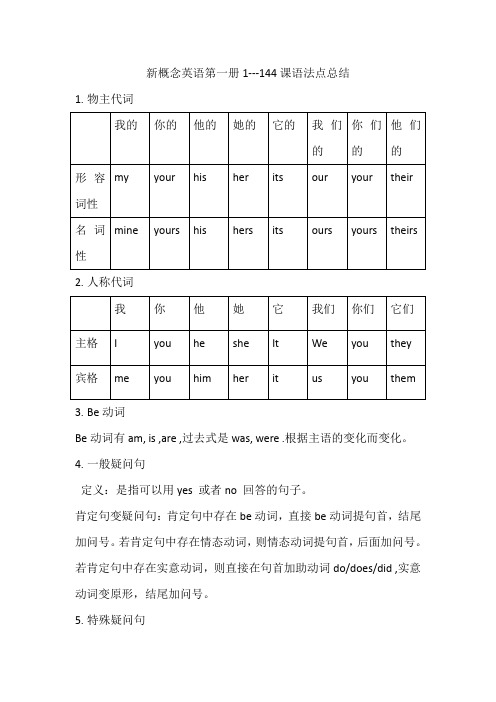
新概念英语第一册1---144课语法点总结1.物主代词2.人称代词3.Be动词Be动词有am, is ,are ,过去式是was, were .根据主语的变化而变化。
4.一般疑问句定义:是指可以用yes 或者no 回答的句子。
肯定句变疑问句:肯定句中存在be动词,直接be动词提句首,结尾加问号。
若肯定句中存在情态动词,则情态动词提句首,后面加问号。
若肯定句中存在实意动词,则直接在句首加助动词do/does/did ,实意动词变原形,结尾加问号。
5.特殊疑问句定义:不能用yes或者no 回答的句子。
构成:特殊疑问词+一般疑问句特殊疑问词有:what (什么),when (何时),where (何地), who (谁), whom (谁宾格) ,whose (谁的), which (哪个),why(为什么) , how (怎么样).口诀:8w1h.6.不定冠词a/ an以a,e , i, o , 开头的单词前,表示一个的要用an .若单词以u开头的单词,视情况而定,发本身因时,前面加a.其他加an .若一个字母单独出现时,加an 的字母:a,e,i,o; x , r, s, l , n , f , m , h (学而思送来那份美好)7.形容词用法:形容词多放在名词或代词前面,对他们起修饰或限定作用。
通常用来说明人或事物的大小,颜色,形状或者特征等。
注意:当形容词单独出现时,前面不可加a/an. 如果一个名词前有多个形容词修饰,排字口诀:美小圆旧黄,法国木书房。
8.名词所有格。
构成:一般情况下,有生命的直接在名词后加’s. 无生命的用of 含义:名词所有格表示........的若名词变复数后词尾有s的,直接加‘即可。
9.名词复数的规则变化:一般情况加-s 清辅音后读/s/map-maps 浊辅音和元音后读/z/ bag-bags以s, sh, ch, x等结尾加-es 读/iz/ bus-buses/ watch-watches以辅音字母+y结尾变y 为i再加es 读/z/ baby---babies名词复数特殊形式1)以y结尾的专有名词,或元音字母+y 结尾的名词变复数时,直接加s变复数。
新概念英语笔记

新概念英语笔记Lesson 1: Excuse me新概念英语第一册是针对中学生和成人初学者而设计的一本教材,其内容涉及如下几方面:一、语音二、词汇三、课文四、语法学习方法与指导一、语音英语音标的系统讲解将在前四十课内完成。
通过对语音部分系统全面的学习,了解英语的基本发音规律及特点,掌握英语单词的读音规则及句子的发音技巧,为今后的英语学习奠定良好的语音基础。
学生首先要听清楚每个的发音,掌握其要领,然后认真模仿,争取把每一个音都发得准确、到位。
二、词汇本教材蕴含了丰富的词汇。
第一册单词比较常用,而且也都简单易懂,在授课过程中,我们又以书上的生词为基础,有针对性地对这些单词作了必要的补充。
比如同义词、反义词及这些单词的副词、形容词和名词形式等等。
学生可以运用单词联想记忆法迅速扩充词汇,同时还可以了解一些英语的基本的构词法,使单词的记忆变得更轻松。
同时我们也对一些词汇的其它常用意思和用法作了适当的补充,而且所补充的这些单词不是孤立的,他们都附有大量的例句,以便学生能够清楚地知道运用这些词汇的具体情景,使学生在词汇的运用上把握得更准确、自如,从而达到事半功倍的效果。
三、课文多为对话,不涉及写作方面的知识,也没有长篇阅读的文章,内容简单易懂。
课文中的语言多为生活化的语言,具有很强的实用性。
学生要充分利用课文现有的资源,首先要多听,多读,尽量地模仿它的语音语调,并最终达到学以致用。
四、语法第一册将涉及到如下语法项目:1)名词的单复数形式、助动词和情态动词的用法、介词短语、There be 句型、定语从句、形容词和副词的比较级和最高级等等2)现在进行时、一般现在时、一般过去时、过去进行时、现在完成时、过去完成时和将来时要准确地掌握语法规则才能准确地把握句子结构。
有了较强的语法功底才能更好地,系统地掌握一门外语。
学生首先要对这些概念做到心中有数。
最终学到的知识都是为了实际运用,而一口流利的英语一定是从实践中锻炼出来的。
新概念英语第一册笔记L1-2
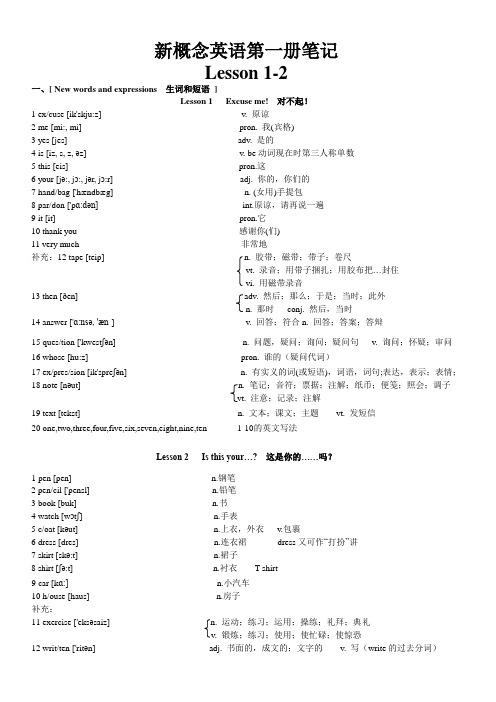
新概念英语第一册笔记Lesson 1-2一、[ New words and expressions 生词和短语]Lesson 1 Excuse me! 对不起!1 ex/cuse [ik'skju:z] v. 原谅2 me [mi:, mi] pron. 我(宾格)3 yes [jes] adv. 是的4 is [iz, s, z, əz] v. be动词现在时第三人称单数5 this [eis] pron.这6 your [jə:, jɔ:, jər, jɔ:r] adj. 你的,你们的7 hand/bag ['hændbæg] n. (女用)手提包8 par/don ['pɑ:dən] int.原谅,请再说一遍9 it [it] pron.它10 thank you 感谢你(们)11 very much 非常地补充:12 tape [teip] n. 胶带;磁带;带子;卷尺vt. 录音;用带子捆扎;用胶布把…封住vi. 用磁带录音13 then [ðen] adv. 然后;那么;于是;当时;此外n. 那时conj. 然后,当时14 answer ['ɑ:nsə, 'æn-] v. 回答;符合n. 回答;答案;答辩15 ques/tion ['kwestʃən] n. 问题,疑问;询问;疑问句v. 询问;怀疑;审问16 whose [hu:z] pron. 谁的(疑问代词)17 ex/pres/sion [ik'spreʃən] n. 有实义的词(或短语),词语,词句;表达,表示;表情;18 note [nəut] n. 笔记;音符;票据;注解;纸币;便笺;照会;调子vt. 注意;记录;注解19 text [tekst] n. 文本;课文;主题vt. 发短信20 one,two,three,four,five,six,seven,eight,nine,ten 1-10的英文写法Lesson 2 Is this your…?这是你的……吗?1 pen [pen] n.钢笔2 pen/cil ['pensl] n.铅笔3 book [buk] n.书4 watch [wɔtʃ] n.手表5 c/oat [kəut] n.上衣,外衣v.包裹6 dress [dres] n.连衣裙dress又可作“打扮”讲7 skirt [skə:t] n.裙子8 shirt [ʃə:t] n.衬衣T-shirt9 car [kɑ:]n.小汽车10 h/ouse [haus] n.房子补充:11 exercise ['eksəsaiz] n. 运动;练习;运用;操练;礼拜;典礼v. 锻炼;练习;使用;使忙碌;使惊恐12 writ/ten ['ritən] adj. 书面的,成文的;文字的v. 写(write的过去分词)13 write [rait] vi. 写,写字;写作,作曲;写信vt. 写,书写;写信给;著述14 copy ['kɒpɪ] n. 副本;一册;摹仿v. 复制;复印;抄袭15 these [ði:z] pron. 这些adj. 这些的16 sen/tence ['sent(ə)ns] n. [语][计] 句子,命题;宣判,判决vt. 判决,宣判17 study ['stʌdɪ] n. 学习,研究;课题;书房;学问vt. 学习;考虑;攻读;细察18 furt/her ['fə:ðə] adv. 进一步地;而且;更远地adj. 更远的;深一层的vt. 促进,助长;增进19 gram/mar ['græmə] n. 语法;语法书二、[Word study 词汇学习 ]Lesson 1 Excuse me! 对不起!1、Excuse v. 原谅[补充] n. 1)借口;理由;2)辩解vt. 1) 原谅;宽恕;2)为……辩解[搭配] Excuse me.原谅;打搅一下;对不起In excuse of 为……辩解[记忆]以-use结尾的单词还有:use [ju:z] vt. & n. 使用amuse [ə'mju:z] vt. 娱乐;消遣;使发笑;使愉快refuse [ri'fju:z, ri:-] n. 垃圾;废物v. 拒绝;不愿;抵制[同义词] pardon; forgive [fə'ɡiv]v. 原谅;免除(债务、义务等)2、me(1)主格:用在句首,一般作主语。
新概念英语第一册笔记1-10
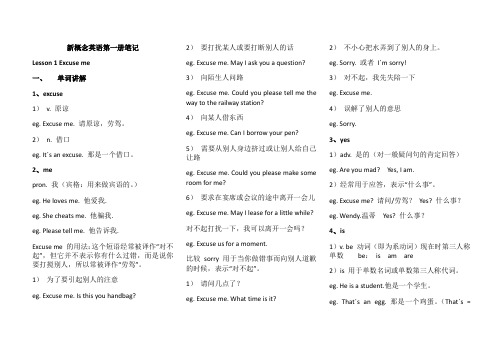
新概念英语第一册笔记Lesson 1 Excuse me一、单词讲解1、excuse1)v. 原谅eg. Excuse me. 请原谅,劳驾。
2)n. 借口eg. It΄s an excuse.那是一个借口。
2、mepron. 我(宾格:用来做宾语的。
)eg. He loves me. 他爱我.eg. She cheats me. 他骗我.eg. Please tell me. 他告诉我.Excuse me 的用法:这个短语经常被译作“对不起”,但它并不表示你有什么过错,而是说你要打搅别人,所以常被译作“劳驾”。
1)为了要引起别人的注意eg. Excuse me. Is this you handbag? 2)要打扰某人或要打断别人的话eg. Excuse me. May I ask you a question?3)向陌生人问路eg. Excuse me. Could you please tell me theway to the railway station?4)向某人借东西eg. Excuse me. Can I borrow your pen?5)需要从别人身边挤过或让别人给自己让路eg. Excuse me. Could you please make someroom for me?6)要求在宴席或会议的途中离开一会儿eg. Excuse me. May I lease for a little while?对不起打扰一下,我可以离开一会吗?eg. Excuse us for a moment.比较sorry 用于当你做错事而向别人道歉的时候,表示“对不起”。
1)请问几点了?eg. Excuse me. What time is it?2)不小心把水弄到了别人的身上。
eg. Sorry. 或者I΄m sorry!3)对不起,我先失陪一下eg. Excuse me.4)误解了别人的意思eg. Sorry.3、yes1)adv. 是的(对一般疑问句的肯定回答)eg. Are you mad? Yes, I am.2)经常用于应答,表示“什么事”。
- 1、下载文档前请自行甄别文档内容的完整性,平台不提供额外的编辑、内容补充、找答案等附加服务。
- 2、"仅部分预览"的文档,不可在线预览部分如存在完整性等问题,可反馈申请退款(可完整预览的文档不适用该条件!)。
- 3、如文档侵犯您的权益,请联系客服反馈,我们会尽快为您处理(人工客服工作时间:9:00-18:30)。
新概念英语| 第一册(Lesson 1)学习笔记
新概念英语(第一册)
一、适合对象
1. 已经具备字母、音标基础的初级学员;
2. 处于英语初学阶段的小学高年级和初中学生;
3. 英语基础几乎为零,希望能从头开始,打牢英语基础的学习者;
4. 想在小升初考试和中考中取得好成绩的同学。
【生词及短语】
1.excuse /iks'kju:z/ v. 原谅
2.me /mi:/ pron. 我(宾格)
3.is /iz/ v. be 动词单数第三人称
4.yes /jes/ adv. 是的
5.this /ðis/ pron. 这
6.your /jɔ:(r)/ (possessive adjective) 你的、你们的
7.handbag / 'hændbæg/ n. 手提包
8.pardon /'pɑ:dn/ int. 原谅,请再说一遍
9.It /it/ pron. 它
10.thank you /θæŋk-ju:/ 感谢你(们)
11.very much / 'veri-mʌtʃ/ 非常
【课文解析】
1.Excuse me!
这是常用于表示道歉的客套话,相当于汉语中的“劳驾”、“对不起”。
当我们要引起别人的注意、要打搅别人或者打断别人的话时,通常都可以使用这个表达方式。
(1)引起别人的注意:
eg:Excuse me,is this your handbag?
(2)要打扰某人或打断别人说话:
eg:Excuse me,may I ask you a question?
(3)向某人借东西
eg. Excuse me,can I borrow your pen?
(4)Excuse me,can I borrow your …?
—Ok,here you are.
—Sorry,I don’t have.
2.yes? /jes/
(1)adv. 是的(用于一般疑问句的肯定回答)eg: Are you a student? 你是一名学生么?Yes,I am. 是的,我是。
(2)经常用于应答,表示“什么事”
eg:Excuse me ? 请问/劳驾?
Yes ? 什么事?
3.Is this your handbag?
Is this your ?这是你的吗?
Is this your bike?
Is this your car?
Is this your house?
4.Pardon?
对不起请您再说一遍。
当我们没有听清楚或者没有理解对方说话并希望能重复述一遍时,就可以使用这种表达方式。
较为正式的说法是:
I beg your pardon.
5.Yes, it is .
表示肯定回答。
注意it is 要连读。
6.Thank you very much.
very much 程度副词短语,表示“非常”。
【语法要点】
一般疑问句
1.一般疑问句的回答比较简单。
一般来说,是“用什么问,用什么答。
”
2.答案是Yes或No的疑问句是一般疑问句。
【原文重现】
Is this your handbag ?
【语法解读】
构成结构:be 动词+主语+......?
△Is (be动词)this (代词,做主语)your bandbag (表语)?Yes,it is.(肯定回答)
No.it isn't.(否定回答)。
